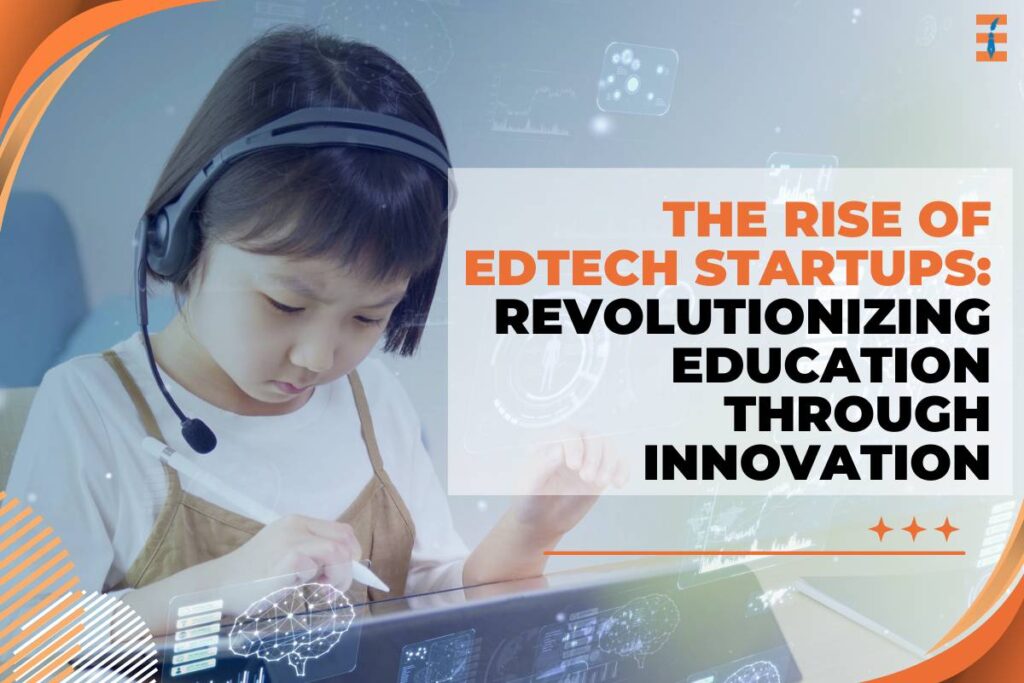In recent years, the education sector has witnessed a remarkable transformation, thanks to the emergence of EdTech startups. These innovative companies are leveraging technology to revolutionize traditional learning methods, making education more accessible, engaging, and effective than ever before. In this comprehensive guide, we’ll delve into the world of EdTech startups, exploring their impact, key trends, challenges, and the future of education.
Understanding EdTech Startups
These are entrepreneurial ventures that focus on developing and delivering technology-based solutions to enhance teaching, learning, and educational outcomes. These startups operate across various segments of the education industry, including K-12 education, higher education, corporate training, and lifelong learning.
The Impact of EdTech Startups

These are disrupting the traditional education landscape in several ways:
1. Accessibility
Through online platforms and mobile apps, these startups are making education accessible to learners worldwide, regardless of their geographical location or socioeconomic background.
2. Personalized Learning
By leveraging artificial intelligence (AI) and machine learning algorithms, these startups are offering personalized learning experiences tailored to each student’s individual needs, learning pace, and preferences.
3. Interactive Content
EdTech startups are creating engaging and interactive educational content, including videos, simulations, games, and virtual reality (VR) experiences, to make learning more enjoyable and effective.
4. Skill Development
With a focus on 21st-century skills such as critical thinking, creativity, communication, and collaboration, these startups are equipping learners with the competencies needed to succeed in the digital age.
Key Trends in EdTech
Several trends are shaping the evolution of these startups:
1. Remote Learning
The COVID-19 pandemic has accelerated the adoption of remote learning solutions, leading to increased demand for EdTech tools and platforms that facilitate online education.
2. Gamification
Gamification techniques, such as badges, leaderboards, and rewards, are being integrated into educational apps and platforms to enhance student engagement and motivation.
3. Adaptive Learning
EdTech startups are developing adaptive learning systems that adjust the difficulty level and content based on each student’s performance and learning trajectory.
4. Data Analytics
The use of data analytics and learning analytics is enabling these startups to gain insights into student behavior, preferences, and learning outcomes, thereby optimizing their educational offerings.
Challenges Facing EdTech Startups

Despite their rapid growth and potential, these startups face several challenges, including:
1. Access to Funding
Securing adequate funding is a common challenge for these startups, given the high development costs associated with building and scaling technology-based educational solutions.
2. Regulatory Compliance
These startups must navigate complex regulatory frameworks and compliance requirements, particularly in the highly regulated education sector.
3. User Adoption
Convincing educators, students, parents, and educational institutions to adopt new EdTech tools and platforms can be challenging, requiring effective marketing and user engagement strategies.
The Future of Education

As EdTech startups continue to innovate and evolve, the future of education looks promising. Key trends shaping the future of education include:
1. Blended Learning
The integration of online and offline learning modalities, known as blended learning, is expected to become increasingly prevalent, offering the flexibility and benefits of both traditional and digital education.
2. Lifelong Learning
With the rapid pace of technological change and job market disruptions, lifelong learning is becoming essential for individuals to stay competitive and adapt to evolving skill requirements.
3. AI-Powered Education
Artificial intelligence and machine learning technologies will play a significant role in personalized learning, adaptive assessments, and intelligent tutoring systems, enhancing the effectiveness and efficiency of education.
Conclusion
EdTech startups are at the forefront of transforming education through innovation. By leveraging technology, data analytics, and pedagogical expertise, these startups are addressing the diverse needs and challenges of learners in the digital age. As the EdTech ecosystem continues to evolve, the future of education holds immense potential for personalized, interactive, and lifelong learning experiences. Embracing these startups can pave the way for a more inclusive, equitable, and empowered education system for all.
Frequently Asked Questions (FAQs)
1. What exactly are EdTech startups?
Ans: These startups are entrepreneurial ventures that utilize technology to develop and deliver educational solutions, ranging from online learning platforms and mobile apps to virtual reality experiences and adaptive learning systems. These startups aim to enhance teaching, learning, and educational outcomes through innovative use of technology.
2. How do EdTech startups impact traditional education methods?
Ans: These startups disrupt traditional education methods by offering accessibility to learners worldwide, personalized learning experiences tailored to individual needs, interactive and engaging content, and skill development for the digital age. By leveraging technology, these startups aim to make education more accessible, effective, and engaging for all learners.
3. What are some key trends driving the growth of EdTech startups?
Ans: Several key trends are shaping the growth of these startups, including the increased adoption of remote learning solutions due to the COVID-19 pandemic, the integration of gamification techniques to enhance student engagement, the development of adaptive learning systems, and the use of data analytics to gain insights into student behavior and learning outcomes.
4. What challenges do EdTech startups face in the education sector?
Ans: These startups face challenges such as securing adequate funding for development and scaling, navigating complex regulatory frameworks, and convincing educators, students, parents, and educational institutions to adopt new technologies. Additionally, ensuring user privacy and data security are significant concerns in the education sector.
5. What does the future hold for education with the rise of EdTech startups?
Ans: The future of education with the rise of these startups looks promising, with trends such as blended learning, lifelong learning, and AI-powered education expected to become increasingly prevalent. These startups have the potential to create a more inclusive, equitable, and empowered education system that meets the diverse needs of learners in the digital age.

An Overview of EdTech StartUps in 2023
The education sector has been hit worst by COVID-19. Remote employment, internet commerce, and the medical industry all stay mostly unchanged. However, educational institutions are among the most hit businesses.










